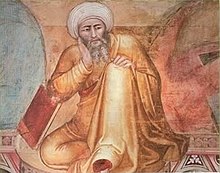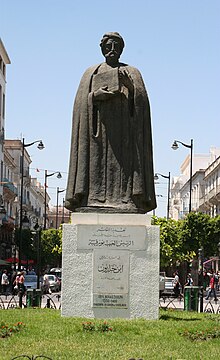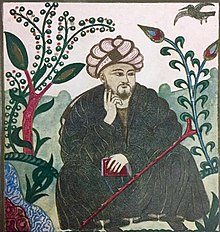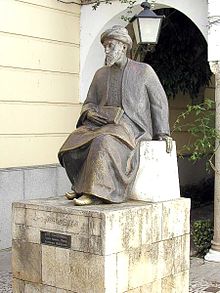Islamic philosophy

The Islamic philosophy ( in Arabic الفلسفة الإسلامية al falsafa-l-islamiya ) conceptually includes the philosophies developedin the Islamic world. The justification of the term is controversial. When it comes to philosophy in the Islamic world, as is the case here, this also includes Jewish philosophers and other non-Muslim scholars, mostly published in the scientific language of Arabic, and we therefore also speak of Arabic philosophy , Arabic-Islamic philosophy or philosophers of Arabic- islamic culture . The academic occupation with the topic falls into the subject areas of philosophy, Islamic studies and other orientalistic cultural studies .
Subject area
The subject area of what "Islamic philosophy" describes can be limited and interpreted in different ways. Oliver Leaman argues that this is about philosophy that emerged in the context of Islamic culture . This description does not assume that Islamic philosophy necessarily has to do with religious questions, nor that it has to be supported by Muslims.
From a European perspective, because of its Greek character, Islamic philosophy is not an intercultural philosophy like the Chinese or African philosophy . Religious traditions, beliefs, Islamic jurisprudence and ways of life of Islam and the question of how these are compatible with philosophical concepts also shape many debates of Islamic philosophy.
In Arabic, “philosophy” refers to an independent discipline alongside, for example, grammar, the biography of the prophets ( Sira ), law ( Fiqh ) or theology. Nonetheless, philosophically relevant concepts and discussions can also be found in other disciplines, such as ijtihād . In particular, the systematic, “dialectical” theology ( Kalām , literally “speech”), whose specialist “Mutakallimūn”, also discusses numerous classical philosophical topics, depending on the school-specific and individual characteristics of the representatives. The term “Mutakallimūn” was originally used for the Mu'tazilites, then also for other theological schools. The methodological advances had parallels or effects in other disciplines such as medicine or sociology . One of the problems with this is how certain statements in the Koran and prophetic traditions ( hadith ), such as that God has a hand, are to be interpreted: are the texts to be taken literally or are they in the light of certain concepts, such as that of incorporeality and simplicity God to interpret? If so, how are these concepts to be understood in more detail? Another problem area is that of free will . This affirms, for example, the Qadarīya school of faith ( qadara “to have power”). It is denied by the Jabrites ( ğabr “force” or “compulsion”) who defend a fatalism .
8th and 9th centuries - the translation movement
As part of a broader process of acquiring ancient knowledge, Greek philosophy - especially Aristotelian and Neoplatonic works - was also taken up by the Arabs. Almost all secular works of ancient Greece that were accessible in the Middle East and the east of the Byzantine Empire were translated into Arabic . Many non-Muslims, above all Syrian Christians - Syrian served as the transfer language - but also Byzantines and Persians participated. This process, in its deliberate and purposeful form, began in the middle of the eighth century. Previously - despite the Islamic expansion - the need for translations into Arabic had been low, as Greek was still the dominant language in the eastern Mediterranean. The actual beginning of the translation movement, however, is only set after the accession of caliph al-Ma'mūn in 813, as the number of translations increased significantly from this point on. The mass translation of philosophical writings in the narrower sense only began with the circle of al-Kindī and the so-called Baghdad Aristotelians , before many mathematical and medical writings had already been translated. Al-Ma'mūn founded a cultural institute in Baghdad in 825 AD , the House of Wisdom , where important translations were made and Greek philosophy was studied and commented on.
One of the cultural centers was Basra , where the theological schools split in the second century of the hijra . Wāsil ibn ʿAtā ' was excluded because of dogmatic innovations. He founded his own school, that of the Muʿtazila . Its central tenets included:
- God is an absolute unity , he has no essential attributes. Texts that suggest this are to be interpreted differently.
- Man is free. Because of these two principles, the Mu'tazilites called themselves “defenders of justice and unity”.
- All knowledge necessary for the redemption of man emerges from his reason; Both before and after Islamic revelation, people could acquire knowledge through the light of reason alone. This makes knowledge binding for all people, everywhere and at all times.
9-11 century
The most important Islamic philosophers in the period after al-Kindī up to the 11th century include al-Fārābī and the Persians Avicenna and al-Ghazālī . With the exception of the latter, all of them represent a Neoplatonic- tinged Aristotelianism , but with different accents. As with Jewish and Christian thinkers, these traditions could not be easily combined in every respect with one's own faith tradition. For example, Aristotle represented an eternity of matter (see eternity of the world ) instead of a divine creation out of nothing . According to him, God only thinks of himself. At most, knowledge of general concepts comes into consideration, but not of individuals. How then is God's providence conceivable? According to Aristotelian epistemology (possibly modified by Neoplatonic elements), how is prophecy conceivable? How does the path of salvation described in religious traditions fit in with the determination of the human being, which, according to Aristotle, lies in the theoretically contemplative way of life, as well as with the important conception of the intellect ? How does the belief in an individual survival after earthly death (see immortality ) fit in with philosophical concepts of the soul? According to difficult-to-understand remarks made by Aristotle and then his commentators, this is understood to mean that it is initially only an ability that is enabled through education and excellence to unite with the active intellect that proceeds from God (or is also identified with him). Other problems arise in general metaphysics . Some theological schools, especially the Ashʿarīya , developed a theory that there are no stable substances, but only atoms of objects and moments of time, each created directly by God, but not perpetuating in time of their own accord. This can be understood as a counter-extreme to the eternity of the world. The evidence of God is then often developed using the evidence of the constitution of the world.
Jewish authors also adopt the methodology and concepts of the Arabic kalam. One of the first is Saadia Gaon (892–942), whose work Emunot ve-Deot (The Book of Beliefs and Opinions) also discusses the problems of creating matter, the unity of God, his attributes, the soul, and so on. His position on creation is: God created the world out of nothing ( creatio ex nihilo ), as the Bible in the Old Testament ( 1st Book of Moses ) reports, there is no eternity of matter. He also criticizes the atomic theory of the Mutakallimūn that it contradicts reason and religion. In order to prove the unity or unity of God, he falls back on arguments of the Mutakallimūn. Only the attributes of being ( sifat adh-dhatia ) can be ascribed to God, not the attributes of action ( sifat-al-fi'aliya ). The soul is an even finer substance than that of the heavenly spheres. Here Saadia contradicts the Mutakallimūn, who viewed the soul as an accident ( arad ). His reasoning uses the following premises of the Arabic kalam: “Only a substance can be the substrate of an accident” (i.e., a non-essential property of a thing). Saadia argues: "If the soul were only a accident, it could not have such accidents as wisdom, joy, love etc."
Al-Ghazālī (1058–1111) reports in his book Tahāfut al falāsifah ("The Incoherence of Philosophers") first numerous teachings of Muslim philosophers, especially Avicennas, which he then tries to refute.
12th Century

Medieval Jewish philosophy draws numerous influences from authors such as al-Fārābī and Avicenna. The relationship between religious and philosophical tradition is weighted differently. Yehuda ha-Levi , who also worked as a poet, is, similar to al-Ghazālī, philosophically trained and is particularly close to Neoplatonic ideas, but rejects the strong influence of philosophical criteria and especially some of the doctrines common in Peripatetic traditions. His work Kuzari also contains a criticism of the attempt to support belief systems through philosophical apologetics. He wrote: "Anyone who is convinced of religious truths without examining them or thinking about them has, in my eyes, reached the highest level of perfection." He reduced the sentences of the Mutakallimūn to prove the unity of God to ten, described them in detail and then to close with the words: "Does the Kalam give us more information about God and his attributes than the Prophet gave us ?"
Unlike Yehuda ha-Levi, Maimonides strongly advocates that Jewish intellectuals need a good knowledge of philosophy, especially Farabis, if only in order not to risk numerous errors of faith. His halachic writings also contain metaphysical and epistemological chapters, the content of which represents necessary religious knowledge for educated Jews. Maimonides worked almost exactly at the same time as Averroes , but probably wrote his main philosophical work without (verifiable) knowledge of the writings of his contemporary. Averroes is probably the most important Arab philosopher of the 12th century in terms of history. He responded to the criticism of al-Ghazālī with a counter-criticism. His philosophical position claims particular proximity to that which he understands as the genuinely Aristotelian doctrine. Much of his work consists of commentaries on numerous works by Aristotle, whose historical importance is clear from the fact that the Latin High Middle Ages often simply referred to Averroes as "the commentator". In a separate work, the decisive treatise from 1179 (Fasl al-Maqāl), he sets out a relationship between philosophy and theology and tries to limit the influence of theology by referring to the Koran. According to this, intellectuals have a religious duty to philosophical education, while less educated philosophical teachings are to be withheld. Not least because of this work, he is often considered a representative of an early “Arab Enlightenment ”.
As is common in the Peripatetic tradition, Averroes also held that the spheres have a spiritual nature and that there is a universal emanation through which activity and change, as well as the forms of things and the content of thought, are transmitted. According to Averroes, the existence of the world is not only a possibility, as Avicenna suggested (as a concession to the Orthodox), but also a necessity. He wrote: “Not only is matter eternal, but form is potentially inherent in matter; otherwise it would be a creation ex nihilo . "
Numerous texts of Arabic philosophy have been translated into Hebrew and commented on by members of the family of the Tibbonids , Narboni and Gersonides , including works by Averroes. Above all, the translation school of Toledo is important , where numerous translations into Latin have been worked out.
Later Islamic philosophy
Averroes’s Islamic philosophy was no longer received to the same extent in the Latin Middle Ages, especially hardly as a tradition whose achievement is noteworthy.
Other important Islamic philosophers are, for example, Muhyī d-Dīn Ibn ʿArabī , the Suhrawardi and Mulla-Sadra schools. Some of these schools still have active followers in the Islamic world. A few other important names are listed below and sorted according to whether they received more Shia or Sunni beliefs.
Sunni recipients
Philosophers
- Abhari بحرى
- Ibn Sab'in ابن سبعين
- Kateb-e-Qazwini كاتب قزوينى
- Rasheed-ad-Din Fazlollah رشيدالدين فضل الله, DMG Rašid-ud-din Fazlollāh
- Qutb-ad-din Razi قطب الدين رازى
Theosophists
- Fachr ad-Dīn ar-Rāzī فخرالدين رازى
- Iji ايجى
- Taftazani تفتازانى
- Jordanian جرجانى
"Anti-philosophers"
- Ibn Taimiya and his disciplesابن تيميه
Historian of philosophy

- Zakariya Qazwini زكرياى قزوينى
- Shams ad-Din Muhammad Amuli شمس الدين محمد آملى
- Ibn Chaldun ابن خلدون
Gnostics and Sufis
- Ruzbehan Balqi Shirazi روزبهان بلقى شيرازى
- Attar Neyshaburi عطار نيشابورى
- Umar Suhrawardi عمر سهروردى
- Ibn Arabi and his schoolابن عربى
- Najmeddin Kubra نجم الدين كبرى
- Simnani سمنانى
- Ali Hamedani على همدانى
- Moulana Jalal ad-Din ar-Rumi مولانا
- Mahmoud Shabestari and Shams ad-Din Lahiji محمود شبسترى و شمس الدين لاهيجى
- Abd al-Karim Jili عبدالكريم جيلى
- Ne'matollah Vali Kermani نعمت الله ولى كرمانى
- The Bektaschi بكتاشى
- Djami جامى
- Hossein Kaschefi حسين كاشفى
- Abd al-Qani Nablosi عبدالغنى نابلسى
- Ali Shah only نورعلى شاه
- Zahabiyye ذهبيه
Shiite recipients
- Nasir Ad-din at-Tusi خواجه نصيرالدين توسي
- The Ismailis اسماعيليان
- Shahab al-Din Suhrawardi and the Illuminists شهاب الدين سهروردى و مكتب اشراق
- Jaldaki جلدكى
- The Horufi حروفى
- Sadr ad-Din Dashtaki and the Shiraz School صدرالدين دشتكى و مكتب شيراز
- Mir Damad and the Isfahan School ميرداماد و مكتب اصفهان
- Me Fendereski and his studentsميرفندرسكى
- Sadr ad-Din Shirazi , called Mulla Sadra , and the transcendent theosophy ملاصدرا و حكمت متعاليه
- Rajab Ali Tabrizi and his studentsرجب على تبريزى
- Qazi Sa'id Qumi قاضى سعيد قمى
- The schools of Tehran and Qom مكتب تهران و قم
- The school of Khorasan مكتب خراسان
- Mulla Hadi Sabzevari and the Nishapur School ملاهادى سبزوارى و مكتب نيشابور
Modern Islamic Philosophy
The tradition of Islamic philosophy is still very much alive today. It was by no means abruptly broken off after Mulla Sadra and the Suhrawardi . Mulla Sadra's teaching is called Hikmat-e-Mota'aliye or “transcendent theosophy”, Suhrawardi's teaching is called Hikmat al-Ishraq or “ philosophy of illumination ”. Another inevitable name of modern Islamic philosophy is Muhammad Iqbal , who revived and reshaped the concept of Islamic philosophy among the Muslims of the Indian subcontinent . In addition to his poetic works in Urdu and Persian , his book The Reconstruction of Religious Thought in Islam is considered a milestone in the modern political philosophy of Islam.
In contemporary Islamic countries, the teaching of hikmat or hikmah continues to live on and thrive.
Among the traditional masters of Islamic philosophy, who have been particularly active in the last two decades, the following should be mentioned in particular: علامه طباطبائىor Allameh Tabatabai , the author of countless books including the 27 volume commentary on the Koran al-Mizan (الميزان); Sayyid Abul-Hasan Rafi'i Qazwini (سيد ابوالحسن رفيعى قزوينى), the great master of the Mulla Sadra School, who wrote only a few treatises but taught outstanding students such as Sayyid Jalal-al-Din Ashtiyani (جلال الدين آشتيانى), who studied both with him and with Allameh Tabatabaei, and Allamah Muhammad Salih Ha'iri Simnanin , the loyal advocate of Peripatetic philosophy and opponent of the Mulla Sadra school.
As younger traditional scholars who have recently been active in Islamic philosophy, it is worth noting: Mirza Mahdi Ha'iri , the only one of the traditional class of hakims with a thorough knowledge of the West and author of Ilm-I Kulli and Kavoshha-ye Aqli- Nazari ; Murtaza Motahhari , the best student of Allamah Tabatabai and martyr of the Islamic revolution in Iran ; and Seyyed Hossein Nasr .
Also to be mentioned here are:
- Hajji Agus Salim
- Al-Ibrahimi Mohammed Al-Bachir
- Abdelwahab Bouhdiba
- Tariq Ramadan
- Nasr Hamid Abu Zaid
- Ahmad Milad Karimi
Philosophical reason and (Islamic) religion
As in other religious traditions, the central question for philosophers influenced by Islam is how religious traditions and beliefs can be reconciled with and related to the teachings and concepts of philosophical traditions. Between the extreme positions of flatly rejecting the reception of philosophy, at best using it as a means of defense, but not for content reflection on the one hand or on the other, considering every revealed religion or Islam to be wrong for philosophical reasons, there are different emphases in attempts at a synthesis or a one-sided or to work out mutual transformation of philosophy and religion. Positions which only accept religious truths if there are sufficient philosophical reasons for them, or at least positions which, in case of doubt, attach the ultimate judgment to philosophy, are often called " rationalism ". The individual questions of the philosophy of religion in the context of Islam largely include questions as they are also discussed in the two other great revelation religions, Judaism and Christianity, and how they were discussed to a greater extent in scholastic theology (Kalām), including the following :
- What is the nature of God ? For example, is it possible to know and express the essential attributes of God? How does God's being and being relate to our being and being? Can We Know If God Exists? By which methods? (compare natural theology )
- What is the nature of revelation (and prophecy)? Does revelation mean, for example, the knowledge of certain philosophically debatable sentences? Is It Possible For God To Reveal? Can we know whether divine revelation is actually happening or has happened? What is the status of the Koran - is it created or uncreated, for example?
- If philosophically - or scientifically - justifiable theses cannot obviously be reconciled with theses found in authoritative religious texts, how should we proceed? Which of our religious traditions must be interpreted literally and which allegorically ? Can some also be wrong?
- What is the nature of religious belief? Is it, for example, about taking certain statements that can also be philosophically assessed as true? Which beliefs are possibly necessary to believe in order to be considered a follower of a particular religion?
Literature (selection)
- Monographs and edited volumes
- Peter Adamson , Richard C. Taylor (Eds.): The Cambridge Companion to Arabic Philosophy . University Press, Cambridge 2005, ISBN 0-521-52069-X . ( Publisher site )
- Henry Corbin : History of Islamic Philosophy . Kegan Paul, London 1996, ISBN 0-7103-0416-1 .
- Heidrun Eichner / Matthias Perkams / Christian Schäfer : Islamic Philosophy in the Middle Ages. A manual , Darmstadt 2013.
- Majid Fakhry: A history of Islamic philosophy. (Studies in Oriental culture; Vol. 5). 3. Edition. Columbia University Press, New York 2004, ISBN 0-231-13221-2 ( excerpts ).
- Geert Hendrich: Arabic-Islamic philosophy. History and present. 2nd Edition. Campus-Verlag, Frankfurt / M. 2011, ISBN 978-3-593-39402-2 .
- Wolfgang Günter Lerch : Thinker of the Prophet. The philosophy of Islam . Piper, Munich 2002, ISBN 3-492-23412-7 .
- Hossein Nasr , Oliver Leaman (Ed.): History of Islamic Philosophy. (Routledge History of World Philosophies 5/1). Routledge, London 2003, ISBN 0-415-05667-5 (3 vols., Reprint of the London 1996 edition).
- Ulrich Rudolph : Islamic Philosophy. From the beginning to the present. 2nd Edition. Beck, Munich 2004, ISBN 3-406-50852-9 .
- Gotthard Strohmaier : Thinker in the empire of the caliphs . Pahl-Rugenstein Verlag, Cologne 1979, ISBN 3-7609-0447-5 .
- items
- Gerhard Endreß : The Arab-Islamic Philosophy of the Middle Ages, a research report. In: Journal for the History of Arabic-Islamic Sciences. (ZGAW). Vol. 5 (1989), ISSN 0179-4639 , pp. 1-47.
- Gerhard Endress: Philosophy. In: Wolfdietrich Fischer (Ed.): Outline of Arabic Philology. Vol. 3: Supplement . Verlag Reichert, Wiesbaden 1992, ISBN 3-88226-214-1 , pp. 25-61.
- Gerhard Endress : The scientific literature. In: Helmut Gätje (Ed.): Outline of Arabic Philology. Vol. 2: Literary Studies . Verlag Reichert, Wiesbaden 1987, ISBN 3-88226-145-5 , pp. 400-506.
- Michael Marmura : The Islamic Philosophy of the Middle Ages. In: William M. Watt, Michael Marmura (ed.): Political developments and theological concepts. (Islam; Vol. 2). Kohlhammer, Stuttgart 1985, ISBN 3-17-005707-3 , pp. 320-392.
Web links
- Representations
- Cristina D'Ancona Costa : Greek Sources in Arabic and Islamic Philosophy. In: Edward N. Zalta (Ed.): Stanford Encyclopedia of Philosophy .
- Muhammad Hozien: Islamic Philosophy Online (extensive collection of material, primary and secondary texts )
- Oliver Leaman: Islamic Philosophy , in: E. Craig (Ed.): Routledge Encyclopedia of Philosophy . London 1998.
- Jon McGinnis: Arabic and Islamic Natural Philosophy and Natural Science. In: Edward N. Zalta (Ed.): Stanford Encyclopedia of Philosophy .
- Sarah Pessin: The Influence of Islamic Thought on Maimonides. In: Edward N. Zalta (Ed.): Stanford Encyclopedia of Philosophy .
- Tony Street: Arabic and Islamic Philosophy of Language and Logic. In: Edward N. Zalta (Ed.): Stanford Encyclopedia of Philosophy .
- William Wallace: Arabian philosophy ( Memento of January 23, 2013 in the Internet Archive ). In: Encyclopedia Britannica. 1911.
- Mauro Zonta: Influence of Arabic and Islamic Philosophy on Judaic Thought. In: Edward N. Zalta (Ed.): Stanford Encyclopedia of Philosophy .
- Bibliographic resources
- Thérèse-Anne Druart: Brief Bibliographical Guide in Medieval Islamic Philosophy and Theology (since 1998)
- Herman De Ley: Bibliography on Classical Arabic Philosophy, Uni Gent 2007
- Jan Just Witkam: Islamic manuscripts reference library
- Dictionaries
- Saeed Sheikh: Dictionary of Muslim Philosophy , Lahore, Pakistan 1970 (PDF, 939 kB), database
- Andreas Lammer: Online Dictionary of Arabic Philosophical Terms
Individual evidence
- ↑ Oliver Leaman : Islamic Philosophy. In: Routledge Encyclopedia of Philosophy . Cf. also Mohammad Azadpur: Is “Islamic” Philosophy Islamic? In: Omid Safi (ed.): Voices of Islam. Vol. 5: Voices of Change. Praeger, Wesport, Connecticut / London 2007, pp. 23–41.
- ↑ Cf. Matthias Perkams : A historical overview of Islamic philosophy up to Averroes. In: Heidrun Eichner , Matthias Perkams, Christian Schäfer (eds.): Islamic Philosophy in the Middle Ages. A manual. Darmstadt 2013, p. 13.
- ↑ a b c d e f Cf. Matthias Perkams: The translation of philosophical texts from Greek into Arabic , in: Heidrun Eichner / Matthias Perkams / Christian Schäfer: Islamic Philosophy in the Middle Ages. A manual , Darmstadt 2013, pp. 115–142
- ^ So the report of Maimonides, Moreh , I, 74.
- ↑ Kuzari V.
- ↑ Kuzari III and IV
- ↑ Marcus Joseph Müller (ed.), Munich 1859, trans. Dess. In: Philosophy and Theology of Averroes. Munich 1875. (Reprint: VCH, Weinheim 1991, ISBN 3-527-17625-X ) Facsimiles at archive.org ; New translation by Franz Schupp, The decisive treatise and the making of judgments on the relationship between law and philosophy , Hamburg 2009; engl. Translated by IY Najjar in: Faith and Reason in Islam. Introduction ( Memento of the original from September 12, 2011 in the Internet Archive ) Info: The archive link was inserted automatically and has not yet been checked. Please check the original and archive link according to the instructions and then remove this notice. by M. Fakhry, Oneworld, Oxford, UK 2001 and by Charles E. Butterworth : Decisive Treatise and Epistle Dedicatory . Brigham Young University, Provo, Utah 2002.
- ↑ Thil Guschas: Die Verschollene Aufklerung , Deutschlandradio Kultur, July 26, 2008.
- ↑ Such classifications are criticized by numerous authors, such as Seyyed Hossein Nasr or Imam Musa Sadr .
- ↑ Bozorg Alavi , Manfred Lorenz : Textbook of the Persian language. Verlag Enzyklopädie, Leipzig 1967; 7th, revised edition, Langenscheidt · Verlag Enzyklopädie, Leipzig / Berlin / Munich a. a. 1994. ISBN 3-324-00253-2 , pp. 307 f. (Minovi on the statesman and writer).


